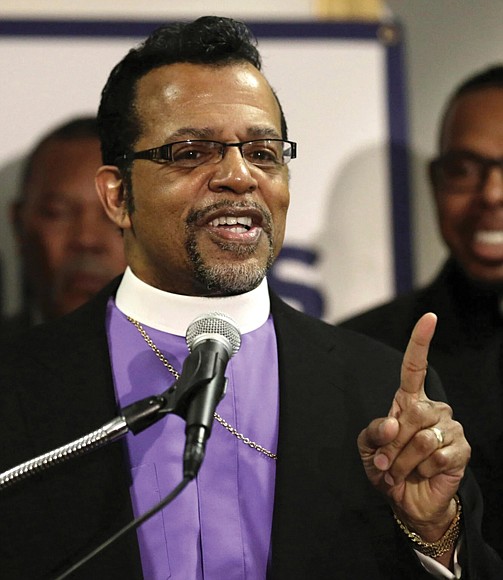Send-offs show Carlton Pearson’s split legacy spurred by his inclusive beliefs, rejection of hell
Darren Sands/Religion News Service | 12/7/2023, 6 p.m.

Before his peers would label him a heretic, the late Bishop Carlton D. Pearson was once one of the best known preachers in the nation.
His skilled biblical oration, steeped in the Black Pentecostal tradition and melded with white evangelicalism, helped swell the membership of the storefront church he started in 1981 in Jenks, Okla., to a full-service, multiracial congregation of more than 5,000.
But things changed dramatically in the 2000s. Bishop Pearson underwent a cataclysmic theological shift that altered the course of his life – and his legacy among the canon of American Christian leaders. Bishop Pearson, 70, died Sunday, Nov. 19, 2023, after a brief battle with cancer.
His splintered influence was underscored this week as different factions paid tribute to Bishop Pearson at various memorial services that have raised questions — and objections — about how best to remember him.
During the apex of his career as leader of Higher Dimensions Evangelistic Center, Bishop Pearson said he heard a message from God that led him to reject hell’s existence and declare that salvation was for everyone, not just Christians.
This “Gospel of Inclusion” doctrine gained him new followers but led thousands to desert him. He was excommunicated and Higher Dimensions was ultimately shuttered.
On Friday, a faction that parted ways with the post-hell-believing Bishop Pearson gave him a memorial send-off in Tulsa, Okla. Transformation Church, a pre-shift spiritual progeny of Higher Dimensions, held a service where Pastor Mike Todd remembered Bishop Pearson as one of their own.
“This is about legacy today. If you have been blessed by the legacy of Carlton Pearson, will you give God a shout of praise in this place? His spirit is in the room right now!” Pastor Todd said in his greeting, noting that Bishop Pearson left them unique instructions not to eulogize him.
“Today we are going to do our best to honor bishop in a way that would make him smile from heaven.”
But for many who supported Bishop Pearson and his inclusive Gospel, they believed there was a better way to honor his memory and ministry.
In his heyday, Bishop Pearson envisioned a modern return to the religious fervor and outpouring of the spirit from the Azusa Street Revival of 1901.
The annual Azusa Conference, held at the Mabee Center on the campus of his alma mater, Oral Roberts University, offered platform for marquee names widely known today, such as T.D. Jakes, Yolanda Adams, and Donnie McClurkin.
That vision was lauded as the height of his legacy, but supporters such as Larry Reid, one of Bishop Pearson’s friends in the New Thought religious movement, say that it’s an incomplete picture of the man who lived 20 years in spiritual exile from the same community he raised up.
“He’ll go down in history, not just for Azusa, but for changing the way that the church shows up in our culture. (We were) judgmental, critical, harsh unkind, rude. As far as the Black church in America, he’s going to go down as (our) Martin Luther,” Mr. Reid said. “He’ll go down in history as reforming the way the church sits with itself and shows up as the love of God on the Earth.”
Mr. Reid told The Associated Press that he was patched into an organizational call about the various memorials being planned and learned Transformation’s service would not include any of the ideology Bishop Pearson espoused later in his career. Ultimately one like-minded friend, Pastor D.E. Paulk of Spirit and Strength Sanctuary in Atlanta, read a passage from Scripture on Friday.
His closest friends and confidents, including Mr. Reid and a United Church of Christ minister, Bishop Yvette Flunder, say an inclusive memorial service more fitting of Bishop Pearson’s theological evolution will be held Dec. 18 in Atlanta.
His friends believe his death is a moment for the Black Church in particular to embrace a more inclusive God and break from the shackles of what Bishop Pearson termed plantation theology with its penchant for using fear as a motivator.
“I believe that is encouraging us to move beyond having denominations and organizations that feel like they have hold on the true and living God and everybody else does not,” said Bishop Flunder. “That is the sin of religion, and it has been that way for a long time.”
Bishop Pearson, a central figure of the charismatic Pentecostal movement that swept the country in the 1970s and 1980s, appeared in another video shown Friday during Transformation’s service after Pastor Todd delivered his opening remarks dressed in a gray suit and fuchsia shirt.
“What ya’ll doing here? Who told you to come to Tulsa and why? Notice I’m in a bed. Jesus said to the disciples, ‘Our friend Lazarus is sleep, let’s go wake him up,’” said Bishop Pearson, flashing his trademark humor before expressing his love to everyone, including to Pastor Todd for hosting the service, and explaining that in death there is life.






